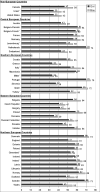Breakfast consumption and its socio-demographic and lifestyle correlates in schoolchildren in 41 countries participating in the HBSC study
- PMID: 19639257
- PMCID: PMC3408388
- DOI: 10.1007/s00038-009-5409-5
Breakfast consumption and its socio-demographic and lifestyle correlates in schoolchildren in 41 countries participating in the HBSC study
Abstract
Objective: To investigate associations of daily breakfast consumption (DBC) with demographic and lifestyle factors in 41 countries.
Design: Survey including nationally representative samples of 11-15 year olds (n = 204,534) (HBSC 2005-2006).
Statistics: Multilevel logistic regression analyses.
Results: DBC varied from 33% (Greek girls) to 75% (Portuguese boys).In most countries, lower DBC was noticed in girls, older adolescents, those with lower family affluence and those living in single-parent families. DBC was positively associated with healthy lifestyle behaviours and negatively with unhealthy lifestyle behaviours.
Conclusion: Breakfast skipping deserves attention in preventive programs. It is common among adolescents, especially girls, older adolescents and those from disadvantaged families.The results indicate that DBC can serve as an indicator to identify children at risk for unhealthy lifestyle behaviours.
Figures
Similar articles
-
Trends from 2002 to 2010 in Daily Breakfast Consumption and its Socio-Demographic Correlates in Adolescents across 31 Countries Participating in the HBSC Study.PLoS One. 2016 Mar 30;11(3):e0151052. doi: 10.1371/journal.pone.0151052. eCollection 2016. PLoS One. 2016. PMID: 27027743 Free PMC article.
-
The Correlation between Adolescent Daily Breakfast Consumption and Socio-Demographic: Trends in 23 European Countries Participating in the Health Behaviour in School-Aged Children Study (2002-2018).Nutrients. 2023 May 24;15(11):2453. doi: 10.3390/nu15112453. Nutrients. 2023. PMID: 37299415 Free PMC article.
-
Socio-demographic and lifestyle factors associated with overweight in a representative sample of 11-15 year olds in France: results from the WHO-Collaborative Health Behaviour in School-aged Children (HBSC) cross-sectional study.BMC Public Health. 2011 Jun 7;11:442. doi: 10.1186/1471-2458-11-442. BMC Public Health. 2011. PMID: 21649892 Free PMC article.
-
Overweight in school-aged children and its relationship with demographic and lifestyle factors: results from the WHO-Collaborative Health Behaviour in School-aged Children (HBSC) study.Int J Public Health. 2009 Sep;54 Suppl 2(Suppl 2):167-79. doi: 10.1007/s00038-009-5408-6. Int J Public Health. 2009. PMID: 19618111 Free PMC article.
-
Breakfast skipping in Greek schoolchildren connected to an unhealthy lifestyle profile. Results from the National Action for Children's Health program.Nutr Diet. 2019 Jul;76(3):328-335. doi: 10.1111/1747-0080.12522. Epub 2019 Mar 5. Nutr Diet. 2019. PMID: 30838749
Cited by
-
Family affluence and cultural capital as indicators of social inequalities in adolescent's eating behaviours: a population-based survey.BMC Public Health. 2012 Nov 28;12:1036. doi: 10.1186/1471-2458-12-1036. BMC Public Health. 2012. PMID: 23190697 Free PMC article.
-
Prevalence of health-risk behaviors among teen girls in Southeastern Iran.Electron Physician. 2018 Jun 25;10(6):6988-6996. doi: 10.19082/6988. eCollection 2018 Jun. Electron Physician. 2018. PMID: 30034668 Free PMC article.
-
Association between breakfast frequency and physical activity and sedentary time: a cross-sectional study in children from 12 countries.BMC Public Health. 2019 Feb 21;19(1):222. doi: 10.1186/s12889-019-6542-6. BMC Public Health. 2019. PMID: 30791951 Free PMC article.
-
[Socioeconomic pattern in unhealthy diet in children and adolescents in Spain].Aten Primaria. 2014 Oct;46(8):433-9. doi: 10.1016/j.aprim.2013.05.010. Epub 2014 Mar 20. Aten Primaria. 2014. PMID: 24656757 Free PMC article. Spanish.
-
Anthropometric, Familial- and Lifestyle-Related Characteristics of School Children Skipping Breakfast in Jeddah, Saudi Arabia.Nutrients. 2020 Nov 29;12(12):3668. doi: 10.3390/nu12123668. Nutrients. 2020. PMID: 33260292 Free PMC article.
References
-
- Matthys C, De Henauw S, Bellernans M, De Maeyer M, De Backer G. Breakfast habits affect overall nutrient profiles in adolescents. Public Health Nutr. 2007;10:413–21. - PubMed
-
- Timlin MT, Pereira MA, Story M, Neumark-Sztainer D. Breakfast eating and weight change in a 5-year prospective analysis of adolescents: Project EAT (eating among teens) Pediatrics. 2008:E638–E645. - PubMed
-
- Affenito SG. Breakfast: a missed opportunity. J Am Diet Assoc. 2007;107:565–9. - PubMed
-
- Rampersaud GC, Pereira MA, Girard BL, Adams J, Metzl JD. Review – Breakfast habits, nutritional status, body weight, and academic performance in children and adolescents. J Am Diet Assoc. 2005;105:743–60. - PubMed
-
- Keski-Rahkonen A, Kaprio J, Rissanen A, Virkkunen M, Rose RJ. Breakfast skipping and health-compromising behaviors in adolescents and adults. Eur J Clin Nutr. 2003;57:842–53. - PubMed
Publication types
MeSH terms
Grants and funding
LinkOut - more resources
Full Text Sources


